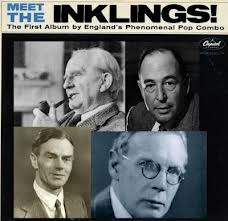J.R.R. Tolkien, C.S. Lewis and some of their friends are often referred to by the name of the informal group that met Thursday nights and Tuesday noontimes of which they are certainly the most famous members: the Inklings. The group was at its peak between 1933 and 1949, but its members became friends before the group was “organized” (if it is fair to apply that word) and to greater or lesser degrees remained friends after.
In the words of regular member, Warnie Lewis (brother of C.S.) “Properly speaking, the Inklings was neither a club nor a literary society, though it partook of the nature of both.” What it was, although perhaps the term would have been unfamiliar to the membership, was a Writer’s Workshop. Members gathered to drink, socialize, but most of all to listen to readings from one another’s works in progress. The Lord of the Rings and Lewis’ “Space Trilogy” were both written and workshopped during these peak years.
These workshopping moments are, necessarily, evanescent, as anyone who has participated in a workshop can attest. The journals of the various members can only reveal so much of what went on at these events (although Humphrey Carpenter places an imaginary reconstruction of a Thursday Night gathering as the 3rd Chapter of Part 3 of his book The Inklings). But there is an unusual document from a few years before the group coalesced that demands to be shared.
Lewis and Tolkien had met in 1926. Lewis’ first reaction to Tolkien was that there was “No harm in him: only needs a smack or so.” In fact, as far as could be seen initially, the two men agreed on nothing, whether it was academic policy regarding “English” as a discipline. religion (Tolkien was a devout Catholic, while Lewis, at that point, was a freethinker and lapsed Anglican), Literature (Tolkien cared almost exclusively about pre-Chaucerian stuff; Lewis was just the opposite). Nonetheless they found common ground in a love of mythology and heroic literature, and within a year or so they were good friends. As the trust between them grew, Tolkien did something that he had very seldom done in his writing life up to that point. He gave Lewis some of his work to read. Specifically he gave Lewis a copy of his poem-in-progress, The Gest of Beren and Lúthien. Lewis responded with the effusiveness and enthusiasm that would come to characterize all his feelings about Tolkien’s writing. On 7 December 1929 he wrote a quick letter to Tolkien describing his binge-reading the first 2000 lines of the poem. “I can quite honestly say it is ages since I had an evening of such delight: and the personal interest of reading a friend’s work has very little to do with it.” At the end of the letter he promised “Detailed criticisms (including grumbles at individual lines) will follow.”
And follow they did. At some point Lewis gave Tolkien fourteen pages of detailed commentary on the first thousand lines (if there was ever more commentary than this, it has been lost). These were published in in 1985 in The Lays of Beleriand, but not in a way that was easy to take in. The main text was published in that book was one that incorporated revisions made in response to Lewis’ critique, so that even by flipping the pages back and forth it was hard to get a good sense of what sort of poem Lewis was actually responding to. My goal here has been twofold: to eliminate the “flipping pages back and forth) by putting Lewis’ commentary in footnotes; and to present Lewis’ commentary in the context of the poem as he actually read it (or as as close as I could get to that).
This is a departure from my usual practice of presenting texts from an “internal” perspective, as if they were taken from the Red Book. But it seems important to have this out there. Among other things, Lewis’ conceit of an authentic Geste, was inspiration to me in initiating this project. Enjoy.

